
Asia Pacific Allergy
Scope & Guideline
Exploring the Frontiers of Allergy Science
Introduction
Aims and Scopes
- Allergic Diseases:
Focus on the epidemiology, pathophysiology, and management of various allergic conditions, including food allergies, asthma, allergic rhinitis, and drug allergies. - Immunological Mechanisms:
Investigation into the underlying immunological processes that contribute to allergic responses, including the roles of T and B cells, cytokines, and other immune mediators. - Clinical Guidelines and Pathways:
Development and dissemination of clinical pathways and guidelines for the diagnosis and management of allergies, ensuring evidence-based practices are accessible to healthcare professionals. - Innovative Therapies:
Exploration of novel therapeutic approaches for managing allergic diseases, including immunotherapy, biologics, and personalized medicine, with a focus on efficacy and safety. - Public Health and Societal Impact:
Research addressing the public health implications of allergies and asthma, including the impact of environmental factors and health policies on allergic disease prevalence and management.
Trending and Emerging
- Impact of COVID-19 on Allergies:
Research exploring the effects of the COVID-19 pandemic on allergy management, including changes in patient care, vaccination responses, and the interplay between viral infections and allergic diseases. - Environmental Influences on Allergies:
Increasing focus on the role of environmental factors, such as air pollution and climate change, in the exacerbation of allergic diseases, driving research on public health interventions. - Immunotherapy Developments:
Significant interest in advancing immunotherapy techniques, particularly oral immunotherapy and biologic therapies, to improve outcomes for patients with food allergies and asthma. - Long COVID and Allergic Responses:
Emerging research on the relationship between long COVID and allergic conditions, particularly regarding persistent inflammation and immune dysregulation. - Integration of Digital Health:
Growing emphasis on the use of digital health tools for allergy diagnosis and management, reflecting a broader trend towards telemedicine and remote patient monitoring.
Declining or Waning
- Traditional Allergen Testing:
There has been a noticeable reduction in publications focused on conventional allergen testing methods, as newer, more innovative techniques are being adopted in clinical practice. - Historical Case Reports:
The frequency of case reports detailing rare allergic reactions or historical perspectives has diminished, possibly indicating a shift towards more generalizable research findings and clinical guidelines. - Non-Specific Allergy Treatments:
A decline in research surrounding non-specific treatments for allergies suggests a movement towards targeted therapies and personalized medicine, aligning with advancements in understanding immunological mechanisms.
Similar Journals

Egyptian Journal of Pediatric Allergy and Immunology
Nurturing the next generation of allergy and immunology scholarship.Welcome to the Egyptian Journal of Pediatric Allergy and Immunology, a leading academic platform dedicated to the advancement of knowledge in the field of pediatric allergy and immunology. Published by the prestigious Egyptian Society of Pediatric Allergy & Immunology, this journal aims to address the pressing challenges and breakthroughs in the diagnosis, treatment, and management of allergic diseases in children. As a crucial resource for researchers, healthcare professionals, and students, it focuses on disseminating high-quality, peer-reviewed articles that contribute to the global understanding of allergic conditions and immunological responses in pediatric populations. Although the journal is currently not an Open Access publication, it provides a valuable gateway to research findings that can shape clinical practice and influence future investigations. With an emphasis on contributing to improved healthcare outcomes for children suffering from allergy and immunology disorders, the Egyptian Journal of Pediatric Allergy and Immunology stands out as an essential reference in the field.
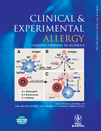
CLINICAL AND EXPERIMENTAL ALLERGY
Unraveling the Complexities of Allergy ScienceCLINICAL AND EXPERIMENTAL ALLERGY is a premier peer-reviewed journal dedicated to advancing the scientific understanding of allergy and immunology. Published by Wiley in the United Kingdom, this esteemed journal maintains a significant impact factor, reflecting its high standards and influential research contributions. With an impressive history since its inception in 1971, the journal is poised to continue leading the discourse in the field until at least 2024. It is ranked in the Q2 quartile for both Immunology and Allergy categories, further highlighting its reputable standing within the academic community. The journal's Scopus rankings showcase its academic relevance, securing the 49th and 51st positions in the Medicine and Immunology categories, respectively. Researchers, professionals, and students will find vital insights and contemporary research trends within its pages, making it an essential resource for those invested in understanding and addressing allergic diseases and disorders.

Postepy Dermatologii i Alergologii
Bridging gaps in knowledge for skin and allergy specialists.Postepy Dermatologii i Alergologii is a distinguished Open Access journal published by TERMEDIA PUBLISHING HOUSE LTD, dedicated to advancing the fields of Dermatology and Immunology and Allergy. Since its inception in 2003, this journal has served as a vital platform for researchers and practitioners alike, promoting knowledge sharing and collaboration in Poland and beyond. With a current impact ranking placing it in the Q3 quartile for both Dermatology and Immunology and Allergy categories, it plays a significant role in contributing to academic discourse within these fields. The journal is indexed in Scopus, with respectable rankings reflecting its relevance and quality—#65/142 in Dermatology and #163/233 in Immunology and Allergy. Researchers are encouraged to explore a vast array of innovative studies and reviews, making it an essential resource for anyone seeking to stay at the forefront of dermatological and allergic research. For those interested in discovering groundbreaking findings and contributing to the ongoing dialogue in these disciplines, Postepy Dermatologii i Alergologii offers not only free accessibility but also a commitment to scholarly excellence.

Frontiers in Allergy
Driving progress in immunological insights and allergy prevention.Frontiers in Allergy is a pioneering open-access journal published by FRONTIERS MEDIA SA, dedicated to advancing the frontiers of research in the fields of Immunology and Infectious Diseases. Launched in 2020 and based in Lausanne, Switzerland, this journal provides a dynamic platform for researchers, professionals, and students to share innovative findings and insights related to allergic disorders and their broader immunological implications. With a respectable Q2 ranking in both Immunology and Allergy and Infectious Diseases categories, as well as being indexed in Scopus, this journal is emerging as a significant resource for the scientific community. The open-access model ensures wide dissemination of valuable knowledge, facilitating collaboration and breakthroughs in treatments and understanding of allergies and related conditions. Frontiers in Allergy invites contributions that drive forward the understanding of immune responses, allergy prevention, and management, solidifying its role as a crucial player in the sustainability and growth of health sciences.
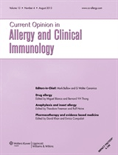
Current Opinion in Allergy and Clinical Immunology
Enhancing clinical strategies through innovative research findings.Current Opinion in Allergy and Clinical Immunology, published by Lippincott Williams & Wilkins, is a pivotal journal that serves as a key resource for professionals in the fields of immunology and allergy. With an ISSN of 1528-4050 and an E-ISSN of 1473-6322, this journal presents cutting-edge reviews of the latest research findings, methodologies, and therapeutic approaches in the management of allergic and immunological disorders. With a Q3 category ranking in both Immunology and Allergy for 2023, and a Scopus rank of #103 in Immunology and Allergy, it reflects a solid position within the scientific community. Operating in the highly dynamic fields of immunology and clinical practice since its inception in 2001, the journal aims to harmonize emerging research trends with clinical applications to enhance patient outcomes. Although it does not currently offer Open Access options, the journal's substantial impact factor attests to its significance as a scholarly resource. By disseminating high-quality reviews and expert opinions, Current Opinion in Allergy and Clinical Immunology continues to foster knowledge advancement and professional development among researchers, practitioners, and students alike.
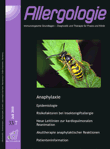
ALLERGOLOGIE
Cultivating a Community of Allergy ExpertsALLERGOLOGIE is a prominent academic journal dedicated to the field of immunology and allergy, published by DUSTRI-VERLAG DR KARL FEISTLE in Germany. Since its inception in 1978, the journal has provided a vital platform for researchers, clinicians, and students to disseminate their findings, share insights, and foster advancements in the understanding of allergic diseases and immunological responses. With an ISSN of 0344-5062 and an E-ISSN of the same number, it is a respected source within its category, currently ranked in the 2023 Q4 of the Scopus metrics in immunology and allergy, reflecting its commitment to quality and scholarly rigor. Although not fully open access, ALLERGOLOGIE makes significant contributions to the dialogue on allergy-related topics, encouraging engagement from its readership through a diverse array of articles that span from clinical trials to innovative research methods. This journal continues to be an essential resource for anyone involved in the pursuit of knowledge in allergy and immunology.
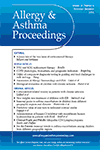
ALLERGY AND ASTHMA PROCEEDINGS
Pioneering the future of Allergy and Asthma treatments.ALLERGY AND ASTHMA PROCEEDINGS, published by Ocean Side Publications Inc, is a vital resource in the fields of Immunology, Allergy, and Pulmonary Medicine. With an impressive trajectory of publication from 1996 to 2024, this journal serves as a platform for cutting-edge research and advancements in the understanding of allergic and asthmatic conditions. Positioned in the Q3 quartile for Immunology and Allergy and Q2 for both Medicine (miscellaneous) and Pulmonary Medicine, the journal exhibits a robust impact within the academic community, boasting Scopus rankings that reflect its significance. The journal offers open access options, allowing for the dissemination of critical findings to a wider audience. Aimed at researchers, healthcare professionals, and students alike, ALLERGY AND ASTHMA PROCEEDINGS addresses the complexities of respiratory diseases and facilitates the sharing of knowledge that is essential to improving patient care and outcomes.
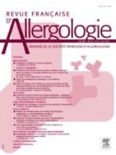
Revue Francaise d Allergologie
Transforming Allergy Insights into Clinical PracticeThe Revue Francaise d'Allergologie, an esteemed publication in the field of Immunology and Allergy, is published by ELSEVIER MASSON, CORP OFF in France. This journal plays a pivotal role in disseminating significant findings and advancements in allergy research and immunotherapy, reflecting the latest trends and challenges in these rapidly evolving areas. As part of its commitment to scholarly rigor, the journal encompasses a wide range of topics pertinent to allergology, aiming to bridge the gap between clinical practice and academic research. Although currently not listed as open access, it provides critical insights essential for researchers, professionals, and students alike, ensuring the advancement of knowledge and therapeutic strategies in allergy and immunology. With its impact factor and positioning in the Q4 category, it serves as a valuable resource, aiding in the education and development of future leaders in the field. The Revue Francaise d'Allergologie continues to be a vital platform for the exchange of innovative ideas and findings from 2009 to the present.

Current Allergy & Clinical Immunology
Advancing the frontiers of allergy and immunology.Current Allergy & Clinical Immunology is a vital peer-reviewed journal published by the Allergy Society of South Africa, focused on advancing the field of immunology and allergy medicine. With an ISSN of 1609-3607, this journal offers crucial insights and research findings pertinent to the understanding and treatment of allergic conditions. Operating from South Africa, it features contributions from a diverse range of authors and professionals in the field. Published from 2008 to 2024, the journal plays an essential role in disseminating current knowledge, even as it holds a Q4 ranking in Immunology and Allergy and is positioned at the 4th percentile based on Scopus rankings. While not open access, it remains an important resource for researchers, practitioners, and students looking to stay informed on emerging trends and breakthroughs in allergy and clinical immunology.

Allergo Journal
Advancing knowledge in Immunology and Allergy.Welcome to the Allergo Journal, a pivotal publication in the field of Immunology and Allergy, housed under the esteemed SPRINGER HEIDELBERG publishing house. With an ISSN of 0941-8849 and E-ISSN 2195-6405, the journal has been serving the scientific community since its inception in 1994. Although its Scopus coverage was discontinued in 2017, the journal remains significant, ranked #135 out of 186 in its category and positioned in the 27th percentile, reflecting its contributions to vital research in allergy and immunological disorders. While the journal is not an open access publication, it continues to provide a platform for rigorous academic discourse and advances in the study of allergens and immune response. The Allergo Journal stands as a crucial resource for researchers, professionals, and students dedicated to deepening their understanding of allergies and immunology, fostering advancements in therapy and comprehensive patient care.